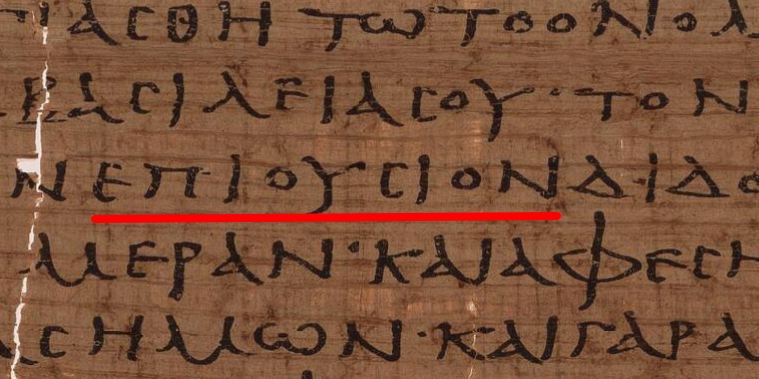the full line being “Give us today our epiousion bread”
Today, most scholars reject the translation of epiousion as meaning daily. The word daily only has a weak connection to any proposed etymologies for epiousion. Moreover, all other instances of “daily” in the English New Testament translate hemera (ἡμέρα, “day”), which does not appear in this usage.[1][2] Because there are several other Greek words based on hemera that mean daily, no reason is apparent to use such an obscure word as epiousion.[4] The daily translation also makes the term redundant, with “this day” already making clear the bread is for the current day.[21]
i don’t think wikipedia mentions this but it has ‘pious’ in the middle
Greek guy here.
Επιούσιος (e-pi-u-si-os) is a composite word (you can make an astronomical number of composite words in Greek if you want to express a new concept, such as tele-phone) and in this sentence it means that which will nourish us for the day. So daily is quite fitting here.
So it’s more like “our day’s worth of bread” than “the bread we eat every day”?
“I’d like my daily ration today”. Sounds removed like that.
If the word was missing from the sentence, then it could be translated as “Give us today our bread and forgive our sins…”.
Instead, with the word added, it can be translated as "Give us today the bread we need for the day and forgive our sins… ".
I guess the significance of the word is in not being greedy and asking from God only what you really need instead of what is “owed” to you?
Nourishing makes sense… Particularly in a context similar to edifying.
I’m fluently bilingual in English and Spanish, and I grew up going to a Spanish speaking Presbyterian church. The kids in my high school taught me that “pan” (the spanish word for “bread”) was slang for “pussy”, so everytime my grandpa (the pastor) recited the Lord’s prayer, I always had a huge smile on my face thinking about him asking God to give us our daily allowance of pussy.
That’s hilarious. It makes sense for pan just to be a shortened ‘panocha’.
That’s the kind of wholesome content I’m here for
Also known by one of the most badass-sounding terms in lexicography: the HAPAX LEGOMENON
I think it means “cromulent”.

These people need to embiggen their vocabulary!
Now it occurs in a post on lemmy
And so shall it echo across the fediverse, amen
I can’t argue the classical Greek etymology, but the argument about redundancy flies in the face how I was taught the Lord’s prayer. “Give us this day our daily bread” ~= “Give us our bread today as you do every day”.
I always took it as sort of like the amount of bread you need every day being “daily bread” and getting it every day.
Even as a kid I always just thought it was a metaphor. It’s not like god is out here giving people literal bread everyday so I figured it was code for “stuff you need to be okay” whether that’s bread or the courage to face the day.
I have only this moment realised that the prayer is referencing the xtian communion giving of bread symbolism, and not just randomly demanding food as if the writer was hungry
Is it, though? Or is it saying “Give us our basic staple needs”? It would be useful if a theologian could chip in on the dates, but I suspect this prayer predates bready communion
From my brief and poorly remembered Christian education, there were at least 3 occasions where the Big J handed out food and drink, and made explicit connection between his god powers, and the catering. So the idea was there in some form from at least the writing of the gospels. But yeah, it would be good to hear from someone who actually knows what they’re talking about.
Historically? All of this is at least disputed. Within the church canon? “[Jesus] broke the bread, gave it to his disciples and said ‘Take this, all of you and eat it, for it is my body, which will be given up for you.’ When [the last] supper had ended he took the cup. Again he gave thanks and praise, gave the cup to his disciples and said 'Take this, all of you, and drink from it. For it is my blood, the blood of the new covenant which will be shed for you and for all so that sin may be forgiven.”
Theologically speaking it’s not a matter of debate at all that communion predates Christ’s death and therefore the founding of the Church or the establishment of the Lord’s prayer.
Communion is the Christianization of the Judaic holiday of Passover. The referenced verses are literally a group of Jews celebrating Passover, on Passover. Not only do the forms of communion predate Christianity, they predate Christ. If you read a few verses before that, possibly depending on which gospel you’re reading, it literally says that.
I’ve heard this as a reference to the bread that was given to the Israelites in the wilderness - manna. In Exodus, the Israelites are instructed to gather and prepare it each day. In the exegesis of that connection, I believe it is Jesus encouraging believers to trust in God for his provision daily.
I thought the mana they are was like… grasshoppers
Let me tell you, 10 year old me in catholic school really thought he was on to some comedy gold when he realized this day and daily was some confusing shit.
Nobody ever laughed. Turned out, I’m not really funny.
If I remember correctly, there’s a group of scholars that translate it as “appropriate.”
Fun story! They came to that conclusion because they discovered a text which had what they believed was another very similar word (“epiousi”) that, in context, meant “necessary” or “enough for now.” That text was a shopping list.
Then the text got lost for a long time, and when they found it again, new eyes on it realized that they’d misread the word, so it was back to square one.
Some denominations, Eastern Orthodox in particular, do translate it as “our needed bread, give us today”
Bakers, however, translate it as “our kneaded bread”
Loaf is all we knead
Great song from the flour-power era.
Give us this appropriate our appropriately bread…
deleted by creator
“How do you like your bread?”
“Appropriate”
deleted by creator
The daily translation also makes the term redundant, with “this day” already making clear the bread is for the current day
Yes, but it doesn’t make it clear that it is something you receive every day. If I say “give us our pizza today” it doesn’t imply that I have a daily pizza party (I don’t, just a silly example).
Why don’t you?
Cowardice, Fear, and Self-Loathing.
It depends. “our daily bread” may mean the ‘bread’ that one needs every day, not necessary the bread that one actually gets everyday.
So it makes sense from the standpoint of someone praying (aka begging) that TODAY they’ll get the nourishment they need every day, because they aren’t really sure if they really will.
It actually makes the “this day” part redundant. Give us our daily bread works fine. I feel like the addition makes it seem like a demand or that it might not come.
that which will nourish us for the day
I don’t think it makes it redundant. If the literal translation of the component words mean “that which will nourish us for the day” as @NoMoreLurking@startrek.website asserts, then it is saying “give us today that which we need to eat for the day.” That’s basically saying, “thanks for giving us today all we need to make it through the day.”
I think I’ll stick to ‘fresh’ or ‘sourdough’ as alternatives from now on
Scribes generally do a good job of checking that they didn’t make an error in transcription . It like likely that what we have is what was written down around ad40-ad90. (Years approximate). Things were written mostly by eyewitness or those who interviewed eye witnesses. The whole reads like it.
Of course things were translated to Greek, it is unlikely that the words were spoken in that language.
Things were written mostly by eyewitness or those who interviewed eye witnesses.
The scholarly consensus is that this is not the case. The earliest written Gospel (Mark) couldn’t have been written any earlier than the occupation of the Temple during the First Jewish Revolt in 66-67, and all indications are that he was writing down traditions that came from his community and others, with no immediate connection to any “eyewitnesses.”
(Source: I have a PhD in this stuff.)
If I remember right, the reason why Mark has scholarly consensus as being written before John is that Mark is least theologically developed, which only really makes sense as evidence for that if you’re starting from the position that the theological bits are later additions. I remember Q and M as evidence for Mark before Matthew or Luke, but is there any evidence that Mark was written before John that doesn’t start with the position that more-developed theology is a later addition?
Why am I being downvoted for asking someone with a PhD in this topic a question about their expertise?
I’m not the person you were responding to, but found your question interesting.
I re-read most of the Wikipedia article on Markan Priority. Imo These parts of the article sum up the argument nicely.
While Marcan priority easily sees Matthew and Luke building upon Mark by adding new material, Marcan posteriority must explain some surprising omissions. Mark has no infancy narrative nor any version of the Lord’s Prayer, for example.
…
Nor does Mark have more than a handful of unique pericopes. This is expected under Marcan priority, where Matthew has reused nearly everything he found in Mark, but if Mark was written last, it is harder to explain why so little new material was added.
…
There are very few passages in Mark with no parallel in either Matthew or Luke, which makes them all the more significant […] If Mark is drawn from Matthew and Luke, it is hard to see why so little material would be added, if anything were going to added at all, and the choice of additions is also rather strange. On the other hand, if Mark was written first, it is easier to see why Matthew and Luke would omit these passages.
Ooooooh - what’s your opinion on the Secret Gospel of Mark? I’m an ex-xtian that copes with the indignity of being indoctrinated into fundamentalism at a young age by devoting way too much of my time into secular lay research into varieties of early Christianity.
PhD in what? Tell me about your opinion on the secret gospel. Not a trap. Just love this shit.
Dr. Dan?
Literally every statement in your comment is false. Read a fucking book that isn’t the bible.










